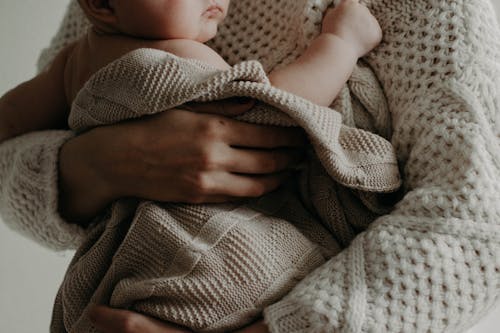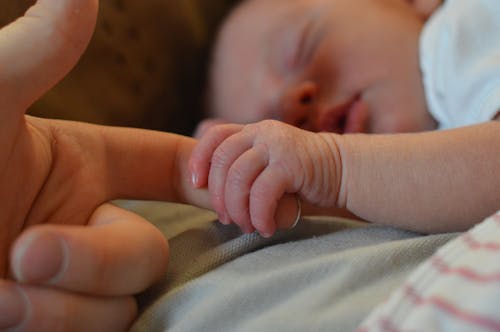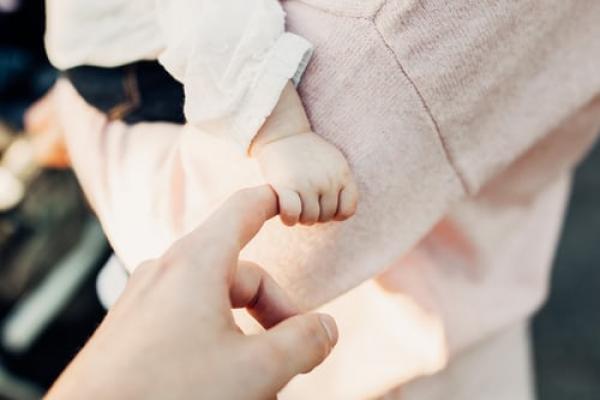Postnatal depression describes the depression a new mother may feel in the first year after giving birth. It begins as what’s known as ‘baby blues’ and eventually progresses, worsening into postnatal depression. Usually around four to six months after the baby’s birth is when the symptoms become most obvious. It can last a considerably long time if untreated, so catching it and diagnosing it early is key so that treatment can begin and you can recover faster.
It is not an uncommon condition, so it’s important to look out for it, even if you think you feel normal. Between 10-15% of women experience it in the first year after baby arrives.

There are a number of symptoms that vary in severity that may point to you having postnatal depression:
- You may be feeling sad, anxious and alone.
- You may be feeling guilty, irritable and angry.
- You may be experiencing panic attacks.
- You may not enjoy being with people, even your baby.
- loss of appetite
- poor concentration
- tiredness all the time
- problems sleeping
- being agitated
- crying easily
Our thoughts can be overwhelming during that first year regardless of whether we have postnatal depression or not, but if you’re thoughts are along these lines:
- feeling inadequate
- feeling panicked
- feeling rejected by your baby
- worrying a lot about your baby
The it might be a sign of something more than just feeling overwhelmed. You may have overwhelming fears, for example about your baby dying. Some mothers have recurring thoughts about harming their baby. Very few mothers ever act on this.

If you’re having any of these thoughts or anything like these thoughts, don’t feel ashamed or embarrassed about seeking help. Most women who undergo treatment for postnatal depression are able to do so at home with their child.
Sometimes, it may be difficult to see that we aren’t feeling ourselves with all the changes that have happened since baby arrived, but a relative, spouse or friend might notice a change in you. If they mention you don’t seem yourself, it’s important to take their concern seriously and get checked out by your GP of midwife services.
Your family and friends may notice that you have postnatal depression before you do. If they mention this to you, take it seriously and seek help from your GP or public health nurse.
There is no known cause for postnatal depression, but there are several factors that coincide with it’s manifestation.

You may be more likely to experience it if:
1. You have a history of depression.
2. You have thyroid gland defect
3. Your lifestyle has significantly changed (which everyone’s does after baby – less sleep, less freedom and more stress)
4. Your relationships are feeling strained – babies change everything including your relationships, and if you’re lacking support, new motherhood can feel very overwhelming.
5. You’ve experienced a stressful life event recently – bereavement, illness or unemployment can trigger this condition with the added stress of a new baby.
The most important thing you can do is ask for help. Seek help early. The sooner you get help, the better you will feel. Talk to your partner, family and friends. Talk to your GP or public health nurse.

Things that are important to remember according to the HSE are:
Express how you’re feeling – people can offer support and help when they understand you need and want it.
Believe that you will get better.
Postnatal depression can be managed with treatment. Trust that you will feel like yourself again.
Eat well and be active. Choose nutritious foods that aren't difficult to cook.
Don't put too much pressure on yourself with housework and other chores. You may need to scale back other activities to focus on you and your baby.
Don't be afraid to ask for help. Ask people you trust to help you with practical things such as housework. Accept genuine offers to babysit and get out for a meal, the cinema or to visit friends.
Take every opportunity to rest.
Try to sleep while your baby is sleeping. If you are breastfeeding, your partner or a friend can give your baby a feed using expressed breastmilk.
Find time for yourself.
Organise a daily treat. It could be a walk in the park, a workout or a coffee and chat with friends.
Spend time with people who care for you.
Don't blame yourself or others. Set time aside for relaxing with your partner, family and friends. A kiss and a cuddle from your partner can be comforting, even if you don't feel like sex.
Meet other mothers.
Find out what support networks are available in your area. These include mother-to-mother support groups, baby and toddler groups and Cuidiú-Irish Childbirth Trust groups.
Mothers in a similar situation can give you emotional and practical support. Your public health nurse may be able to give you details of support groups in your area. You can also find details online, in a local newspaper or at your library.

Irish support groups available are:
- Postnatal Depression Ireland 021 492 2083 www.pnd.ie
- Samaritans 24hr listening service 116 123 www.samaritans.org
- Parentline 1890 92 72 77 www.parentline.ie
- Cuidiú-Irish Childbirth Trust 01 872 4501 www.cuidiu-ict.ie
- Aware 1800 80 48 48www.aware.ie
- Grow 1890 474 474www.grow.ie
British support groups available are:
- The Samaritans: 24-hour free helpline 116 123 ; Email: jo@samaritans.org.
- Association for Post Natal Illness (APNI): Helpline on 020 7386 0868 (10am to 2pm, Monday to Friday) or email info@apni.org
- Pre and Postnatal Depression Advice and Support (PANDAS): Helpline on 0843 28 98 401 (9am to 8pm, Monday to Sunday)
- NCT: Helpline on 0300 330 0700 (8am to midnight, Monday to Sunday)
- Mind, the mental health charity: Infoline on 0300 123 3393 (9am to 6pm, Monday to Friday) or email info@mind.org.uk







